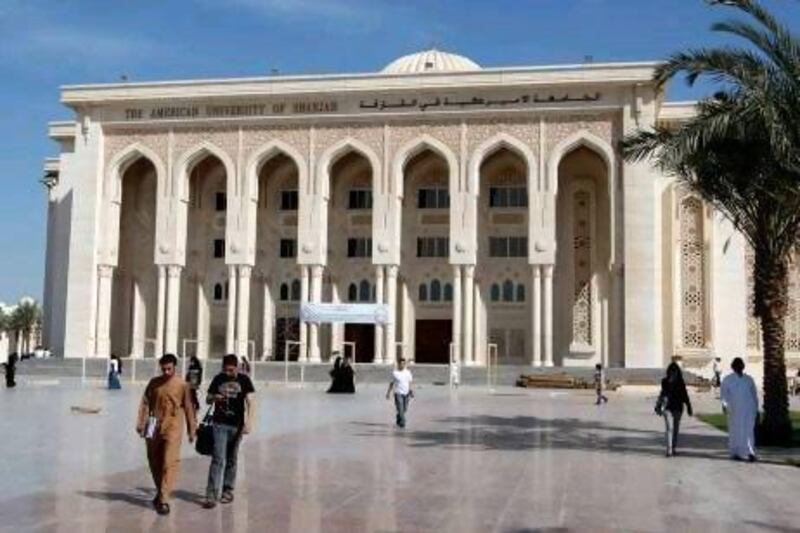DUBAI // When is an American university not an American university? When it has only a fleeting connection with the American education system and awards degrees that are not recognised in the US.
That, at least, is the view of the heads of two of the country's most established American universities.
They are calling for the rules to be tightened and enforced to prevent upstarts misleading students into thinking they offer a US education when they do not.
The older institutions - the American Universities of Dubai and Sharjah - are accredited by bodies in the US, allowing their students to earn real, internationally recognised American degrees.
But two newer ones - the American Universities in the Emirates (AUE) and American University of Ras Al Khaimah (AURAK) - are not.
Dubai's Law 21, passed last year, gives the Knowledge and Human Development Authority (KHDA) power of approval for the names of all 32 universities in the emirate's free zones.
Under its system, universities must be accredited in their home country or proposed affiliation.
US accreditation can come from one of six regional bodies, such as the Western Association of Schools and Colleges. Only degrees accredited by one of those six will be attested by the US state department.
The standards for accreditation are the same whether the universities are in America or elsewhere.
To become accredited, universities must first show they offer a good education. Beyond that, they need to show they are adequately funded and well managed.
They have to submit financial plans, show evidence that they can sustain themselves as institutions - so they can guarantee they will not close and leave students with half-finished degrees - and demonstrate principles such as institutional integrity and ethics.
They are reinspected after five and 10 years, and every 10 years after that, to ensure standards are being maintained.
The American University of Dubai (AUD), founded in 1995, is accredited by the Southern Association of Colleges and Schools, while the American University of Sharjah (AUS), set up two years later, is under the Middle States Association of Colleges and Schools.
By contrast, the American Universities in the Emirates is in practice regulated and accredited only by the Ministry of Higher Education. But it does teach US-style curriculums with grade-point averages and examinations at the end of each semester.
It has in the past approached the Southeastern Association of Schools and the Northeastern Association of Schools and Colleges, but never formally applied for their accreditation.
The university, which opened in 2005 as the American College of the Emirates, does have agreements with several North American institutions including the State University of New York, the University of North Texas and the Canadian University of Regina.
But they are relatively loose arrangements, covering areas such as guest speakers.
Professor Muthanna Razzaq, the president of AUE, admits the name is a selling point.
"It's very attractive for the students," Prof Razzaq said.
AURAK also has little connection with the US education system - to the extent that its last president, Dr Shaukat Mirza, who left in November, proposed changing its name to the University of RAK.
Established in 2009 on the site of the short-lived George Mason University, the university does not yet have accreditation from the ministry, let alone any of the six US bodies.
"The feeling was one will get some easy mileage if we call it as an American university," said Dr Razzaq.
The issue of names is an increasing concern for the ministry's Commission for Academic Accreditation (CAA), which is responsible for licensing and regulation.
The CAA's guidelines from last year state that "national name should not be included in an institutional title as a marketing tool".
They add that the public expected credits and degrees earned at a university with American in its name would be recognised by US institutions.
Prof Ian Cumbus, the head of the CAA, said the issue was gaining a lot more attention, not only in the commission but in organisations such as the KHDA.
Dr Peter Heath, the chancellor of AUS, said while ministry accreditation was a decent assurance of quality, the term "American" should be reserved for US-accredited universities.
"Institutions try to find a tag that will allow them to identify quality," Dr Heath said. "If the term American is taken to mean quality, that's the real problem. To the consumer who doesn't know any different, they're the ones who get penalised."
Dr Lance de Masi, the chancellor at AUD, called for a degree of regulation from the US to help students understand what they are signing up for.
"The US government does not exercise by choice a lot of oversight over the use of the word American, not just in education," Dr de Masi said. "I don't think the embassies and consulates of the world police the use of the word."
It would be better, he said, for students to know that they will be getting a real US degree.
"It's the consumer who gets penalised," added Dr Heath. "It's like a Chinese knock-off of a Gucci bag. It's not going to be the quality."






